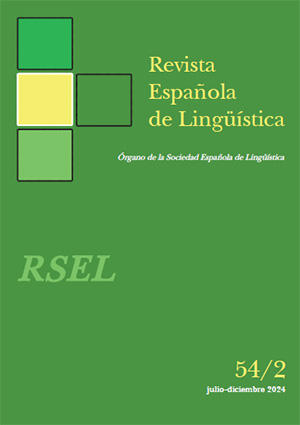Inclusive Readings of the Spanish Pronoun 'no' (‘One’): Grammatical and Pragmatic Properties
Lecturas inclusivas del pronombre uno en español: propiedaes gramaticales y pragmáticas | doi: https://doi.org/10.31810/rsel.54.2.3
Keywords:
pronoun uno; person; evidentiality; genericity; intersubjectivity; speaker concealmentAbstract
The use of pronoun uno (‘one’) in Spanish has been analyzed as an evidential strategy because its use gives clues about the source of information expressed by the proposition. What has not been so thoroughly investigated from a grammatical point of view is the question of what factors allow the pronoun uno, which is a grammatical third person, to refer to the speaker, that is, a first person. This work focuses on investigating this conflict and has three main objectives: our first goal is to study the contexts that differentiate the arbitrary and concealing use of uno. Our second goal is to articulate a proposal that explains the inclusion of the speaker in both uses. We hypothesize that in the arbitrary use the speaker's inclusion derives from a pragmatic inference, while in the concealing use uno is behaving as a definite pronoun. We will investigate why the speaker chooses to use uno instead of yo (‘I’) to refer to himself/herself and how grammar and pragmatics interact to convey subjectivity. Finally, we will explain the inclusive uses of uno from the notions of evidentiality and intersubjectivity. The pronoun uno oscillates between personal experience, general knowledge and shared information.
Downloads
References
Aikhenvald, A. (2004). Evidentiality. Oxford University Press.
Aikhenvald, A. (2018). Evidentiality: the framework. In A. Aikhenvald (Ed.), The Oxford handbook of evidentiality (pp. 1-55). Oxford University Press. doi: https://doi.org/10.1093/oxfordhb/9780198759515.013.1
Bergqvist, H. & Kittilä S. (2017). Person and knowledge: Introduction. Open Linguistics, 3, 18-30. doi: https://doi.org/10.1515/opli-2017-0002
Bermúdez, F. W. (2005). Evidencialidad. La codificación lingüística del punto de vista. PhD dissertation, Stockholm University.
Briz Gómez, A. (1996). El español coloquial: situación y uso. Arco Libros.
Collins, C. (Ed.). (2014). Cross-linguistic studies of imposters and pronominal agreement. Oxford University Press. doi: https://doi.org/10.1093/acprof:oso/9780199336852.001.0001
Collins, C. & Paul, P. (2012). Imposters: A study of pronominal agreement. The MIT Press. doi: https://doi.org/10.7551/mitpress/9780262016889.003.0007
Company Company, C. & Pozas Loyo, J. (2009). Los indefinidos compuestos y los pronombres genérico-impersonales omne y uno. In C. Company (Ed.), Sintaxis histórica de la lengua española: la frase nominal (pp. 1073-222). FCE/UNAM.
Corblin, F. (1987). Indéfini, défini et démonstratif. Droz.
Corblin, F. (2012). The roots of genericity: indefinite singulars vs. definite plurals. In A. Mari, C. Beyssade & F. Del Prete (Eds.), Genericity (pp. 352-372). Oxford University Press.
De Cock, B. (2014). The discursive effects of Spanish uno and se: a case study of the phenomena of speaker inclusion and female-only reference. In D. Glynn & M. Sjölin (Eds.), Subjectivity and epistemicity. Corpus, discourse and literary approaches to stance (pp. 107-120). Lund University Press.
DeMello, G. (2000). Tú impersonal en el habla culta. Nueva Revista de Filología Hispánica, 48(2), 359-372.
Dieck, M. (2016). ¿Y qué más hace uno, pues?: La expresión de la impresonalidad en el español de Medellín. Lingüística y literatura, 69, 145-175.
Dobrovie-Sorin, C. & Beyssade, C. (2012). Redifining indefinites. Springer.
Eberhard, D. M. (2018). Evidentiality in Nambikwara languages. In A. Y. Aikhenvald (Ed.), The Oxford handbook of evidentiality (pp. 333-356). Oxford University Press.
Evans, N., Bergqvist, H. & San Roque, L. (2018a). The grammar of engagement I: framework and initial exemplification. Language and Cognition, 10(1), 110-140.
Evans, N., Bergqvist, H. & San Roque, L. (2018b). The grammar of engagement II: typology and diachrony. Language and Cognition, 10(1), 141-170.
Fábregas Alfaro, A. (2024). Variation, syntax and semantics: person features and the non-specific reading of participants. In M.ª J. Serrano & M. Á. Aijón (Eds.), Form and meaning: Studies of grammatical variation and choice in Spanish (pp. 43-78). Peter Lang.
Floyd, S., Norcliffe, E. & San Roque, L. (Eds.). (2018). Egophoricity, John Benjamins.
Fernández, S. (2008). Generalización y evidencialidad en español. Revue Romane, 43, 217-234. doi: https://doi.org/10.1075/rro.43.2.04fer
Fernández Ramírez, S. (1986 [1951]). Las personas gramaticales. Comprehensión y transposición. Las personas generales. In I. Bosque (Ed.), Gramática española.
El verbo y la oración (pp. 21-57), vol. IV. Arco Libros.
Fernández Soriano, O. & Táboas Baylín, S. (1999). Construcciones impersonales no reflejas. In Ignacio Bosque y Violeta Demonte (Dirs.), Gramática descriptiva de la lengua española (pp. 1723-1778), vol. II. Espasa.
Flores-Ferrán, N. (2009). Are you referring to me? The variable use of uno and yo in oral discourse. Journal of Pragmatics, 41, 1810-1824. doi: https://doi.org/10.1016/j.pragma.2008.09.024
Gelabert-Desnoyer. J. J. (2008). Not so impersonal: intentionality in the use of pronoun uno in contemporary Spanish political discourse. Pragmatics, 18, 407-424. doi: https://doi.org/10.1075/prag.18.3.03gel
Gómez Torrego, L. (1992). La impersonalidad gramatical. Descripción y norma. Arco-Libros.
González Ruiz, R., Izquierdo Alegría, D. & Loureda Lamas, Ó. (eds.). (2016). La evidencialidad en español: teoría y descripción. Iberoamericana Editorial Vervuert.
González Vergara, C. & Hugo Rojas, E. (2010). Cuando te lo piden, uno no siempre sabe qué decir. Uno y tú como estrategias evidenciales en el español de Chile. Actas del IV Congreso Internacional de Letras (pp. 647-654). Universidad de Buenos Aires.
Gónzalez Vergara, C. & Lima, P. (2009). Estrategias de expresión de la evidencialidad en la argumentación oral en la sala de clases. Revista Signos. Estudios de Lingüística, 42, 295-315. doi: http://dx.doi.org/10.4067/S0718-09342009000300001
Guirado, K. (2011). La alternancia tú-uno impersonal en el habla de Caracas. Lingüística, 26, 26-54.
Gutiérrez-Rodríguez, E. (2018). Interpretación genérica de sintagmas nominales con núcleo elíptico. Borealis: An International Journal of Hispanic Linguistics, 7(2), 135-160. doi: https://doi.org/10.7557/1.7.2.4576
Gutiérrez-Rodríguez, E. & Pérez-Ocón, P. (2024). La lectura encubridora evidencial de uno/una. Boletín de Filología, 2, 119-156.
Hernanz Carbó, M. L. (1990). En torno a los sujetos arbitrarios: la 2.ª persona del singular. In V. Demonte y B. Garza (Eds.), Estudios de lingüística de España y México (pp. 151-178). UNAM.
Hidalgo Navarro, A. (1996). Sobre los mecanismos de impersonalización en la conversación coloquial: el tú impersonal. ELUA: Estudios de Lingüística. Universidad de Alicante, 11, 163-176. doi: https://doi.org/10.14198/ELUA1996-1997.11.08
Hintz, D. J. & Hintz, D. M. (2014). The evidential category of mutual knowledge in Quechua. Lingua, 186, 88-111. doi: https://doi.org/10.1016/j.lingua.2014.07.014
Hollaender, J. M. (2002). La referencia en algunas expresiones impersonales. Diferentes lecturas de uno y la segunda persona del singular. Romansk Forum, 16, 127-138.
Hugo Rojas, E. (2011). Las formas de segunda persona singular como estrategias evidenciales. Revista de Lingüística Teórica y Aplicada, 49, 143-167. doi: http://dx.doi.org/10.4067/S0718-48832011000100007
Hurtado, L. M. (2015). El predominio de uno en Bogotá, Colombia: ¿Estrategia para desfocalizar o para subjetivizar? Anuario de Letras. Lingüística y Filología, 3, 105-151. doi: https://doi.org/10.19130/iifl.adel.1333
Kittilä, S. (2019). General knowledge as an evidential category. Linguistics, 57(6), 1271-1304. doi: https://doi.org/10.1515/ling-2019-0027
Krifka, M. (1995). Genericity: an introduction. In G. N. Carlson & F. J. Pelletier (Eds.). The generic book (1-124). The University of Chicago Press.
Mackenzie, J. L. & Martínez Caro, E. (2012). Compare and contrast. An English grammar for speakers of Spanish. Comares.
León-Castro Gómez, M & Repede, D. (2018). El pronombre indefinido uno como estrategia de impersonalización: un estudio en el corpus oral Preseea-Sevilla. Nueva Revista del Pacífico, 69, 67-89. doi: http://dx.doi.org/10.4067/S0719-51762018000200067
Leonetti, M. (1999). El artículo. In I. Bosque y V. Demonte (Dirs.), Gramática descriptiva de la lengua española (pp. 787-890), vol. I. Espasa.
Moltmann, F. (2006). Generic one, arbitrary PRO, and the first person. Natural Language Semantics, 14, 257-281. doi: https://doi.org/10.1007/s11050-006-9002-7
Pérez Álvarez, B. E. & Alanís Torres, R. M.ª. (2022). El pronombre indefinido uno en la dinámica comunicativa. Análisis en un corpus oral de conversaciones. Boletín de Filología, 57, 337–366. doi: http://dx.doi.org/10.4067/S0718-93032022000200337
Plungian, V. A. (2001). The place of evidentiality within the universal grammatical space. Journal of Pragmatics, 33(3), 349-357. doi: https://doi.org/10.1016/S0378-2166(00)00006-0
Pozas Loyo, J. (2010). The Rise and Fall of Impersonal Pronouns in Spanish, ms. University of London.
Real Academia Española & Asociación de Academias de la Lengua Española [RAE-ASALE]. (2009). Nueva gramática de la lengua española. Madrid: Espasa.
Real Academia Española & Asociación de Academias de la Lengua Española [RAE-ASALE]. Banco de datos (CORPES XXI) [on line]. Corpus del Español del Siglo XXI (CORPES). http://www.rae.es [July 1, 2024]
Rasson, M. (2016). Interpretación y tipología del pronombre indefinido uno a partir de tres géneros discursivos. Círculo de Lingüística Aplicada a la comunicación, 67, 227-272. doi: https://doi.org/10.5209/CLAC.53484
Ridruejo Alonso, E. (1981). Uno en construcciones genéricas. Revista de Filología Española, 61, 65-83. doi: https://doi.org/10.3989/rfe.1981.v61.i1/4.610
Sánchez López, C. (2002). Las construcciones con se. Estado de la cuestión. En C. Sánchez (ed.): Las construcciones con se (pp. 18-163). Visor Libros.
Sánchez López, C. (2020). Las modalidades oracionales. Síntesis.
Serrano Montesinos, M.ª J. (2022). Defocusing and the third-person viewpoint: The pronoun uno and its covariation with clitic se in Spanish. Lingua, 280, 1-20. doi: https://doi.org/10.1016/j.lingua.2022.103441
Siewierska, A. (2004). Person. Cambridge University Press. doi: https://doi.org/10.1017/CBO9780511812729
Speas, P. & Tenny, C. L. (2003). Configurational properties of point of view roles. In A. M. Di Sciullo y V. Hill (eds.), Asymmetry in grammar: Syntax and semantics (pp. 315-344). John Benjamins Publishing Company. doi: https://doi.org/10.1075/la.57.15spe
Vazquez Rojas, V. (2014). Indefinite imposters. In C. Collins (ed.), Cross-linguistic studies of imposters and pronominal agreement (pp. 238-258). Oxford University Press.
Vilinbakhova, E. (2024). Conocimiento personal y conocimiento general en los usos de los pronombres uno y one: estudio de corpus paralelos. Boletín de Filología.
Published
How to Cite
Issue
Section
Copyright (c) 2024 Revista Española de Lingüística

This work is licensed under a Creative Commons Attribution-NonCommercial-NoDerivatives 4.0 International License.






